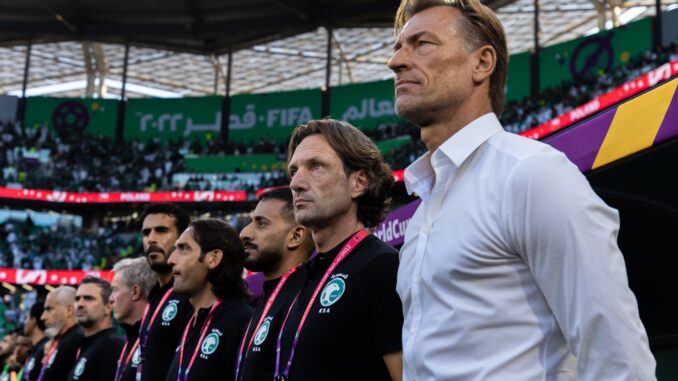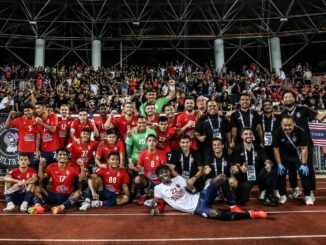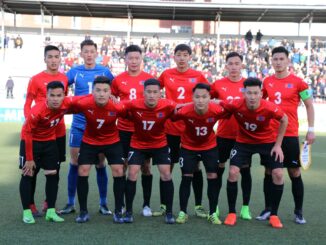
If he could’ve selected his preferred exit, probably having it confirmed online half way through a drab 2-1 defeat at home to Bolivia wasn’t exactly the send-off Herve Renard had in mind.
As Saudi Arabia trudged off however, Renard’s time in charge of the national team came to an end, as he expectantly heads home to take over the French women’s national team ahead of the World Cup in a few months’ time.
Reaction to his departure is acutely split. Those outside Saudi Arabia look back at a successful World Cup campaign, that took in one of the biggest upsets in football history, beating world champions-to-be Argentina in the group phase.
In the other camp, critics consider that moment as an isolated success, within a twelve-month period that has been far from a smooth ride.
Either side of that monumental victory, Renard’s Saudi Arabia have only won twice in thirteen matches over the last twelve months, scoring only seven goals. While the victory over Argentina was spellbinding, defeats in the last week to Venezuela and Bolivia are going to inevitably leave a bitter aftertaste.
Rebuild in the image of Renard
While the last twelve months have been choppy, his reign, stretching back to 2019, can’t be undersold. In succeeding two very different coaches – from the brutally effective Bert van Marwijk, to the ostentatiously open Juan Antonio Pizzi – Renard’s tenure can be characterised as pragmatic, in adopting both his predecessors’ methods when needed.
In search of an immediate return to the World Cup, following a global humbling at the hands of hosts Russia in 2018’s opener, Renard’s qualification spell did take time to come to fruition however. The French coach arguably came within minutes of an early axe six months into the job, in an early six-pointer with Uzbekistan, in which the Green Falcons snatched victory from the jaws of defeat in the final ten minutes in Tashkent.
While a break, inflicted by the global pandemic, regressed many in Asia, Renard took full advantage in fully embedding himself in Saudi football, and preparing a side that comfortably strolled through qualification upon its restart some 18 months later.
In the final phase of qualification, Renard came into his own. The big game, match manipulator, capable of that one-off display of tactical acumen, victories over Australia and Japan, ensured they progressed to the Qatar World Cup ahead of time.
While Saudi Arabia could boast in becoming the first Asian nation to qualify, gnawing concerns already started to swirl; pointedly at their blunt attack that failed to score more than one goal in any away game throughout the final round of qualifiers.
The jewel in the desert
While concerns remained apparent heading into Qatar, Renard’s aptitude to rally a single perfect match, through a high press, and even higher line against Messi and Co. at Lusail Stadium, Saudi Arabia’s 2-1 victory over the South American giants not only showcased Asian football in a positive light, but also the Middle East region, which had taken a severe battering in the run up to the tournament.
A victory over Argentina to start a World Cup can never be discredited, however it probably came too soon in the Saudi’s tournament.
A full throttle, but often nerve tinged encounter with Poland, saw Saudi Arabia lose sight of their campaign; resembling a deer in the headlights against a rampant Mexico in a match that ultimately sealed their fate.
Having honed a way of playing throughout qualification, only to shift that approach for a single standalone encounter against the very best in the world, the remainder of the group felt a little disjointed in the face of the question: “what next?”
It’s difficult as an outsider to diminish their success in Qatar, but Saudi fans will inevitably feel a sense of it being a missed opportunity; having a three-point head start over their rivals, they unquestionably blew their lines.
To the future
While his legacy to date had been defined by a single match, there was hope that it was to serve as a prelude to a tilt at a first Asian Cup title for Saudi Arabia since 1996. Regrettably, that prospect is left unfulfilled.
In his place, the Saudi Arabian Football Federation (SAFF) are reportedly well set to replace Renard, with another sought after foreign coach, former River Plate manager Marcelo Gallardo, one of a number of names linked with the now vacant position.
There was an early suggestion that consistency may have been the preferred short-term option, with U23 coach Saad Al-Shehri, who clinched the U23 Asian Cup last year, and stepped in for Renard in January’s senior Gulf Cup tipped to succeed Renard.
But with Saudi Arabia standing centre stage, not only in Asia, but increasingly in global football, the SAFF were always likely to side with a known quantity.
The priorities for the new coach, are simple: find a way for this team to score goals. As Renard regularly bemoaned throughout his time in charge, Saudi football’s growing standard domestically has been a double-edged sword for the national team.
On one hand, the broad standard of the squad has demonstrably improved on a technical basis, however with an abundance of predominantly attacking foreign talent flooding the league, local striking talent has been pushed out to the fringes.
In their current squad only Firas Al-Buraikan can stake a real claim to be first choice at his club, albeit at mid-table side Al-Fateh, and has always provided more impact as a substitute than from the start.
The eternal search for a starting number nine continues to elude them. The former great hope, Haroune Camara, was once again experimented with at the point of the attack this past week despite never really emulating the sort of potential he demonstrated in his early career, either at either club or international level.
For now, the threat and hope moving forward surrounds the existing order with hopes growingly strapped to the fitness of their two key players in Salman Al-Faraj and Salem Al-Dawsari.
With even one of their key men out, Saudi Arabia look an entirely different proposition, so the very fact Al-Faraj has just picked up another injury that could keep him out of the rest of the Saudi league season, and Al-Dawsari limped off against Bolivia, will only heighten worries that Saudi success in next year’s Asian Cup hangs by a thread.
Whoever arrives in Renard’s shoes needs to build on his vision of progressing Saudi football, as he leaves a project very much in mid-transition.
The departing image of Renard feels incomplete. For the rest of the world, he’ll remain the European prince behind a magical moment of world football history, for some Saudis, they may in private hope it’s a blessing in disguise.
Renard’s true legacy, may in the end, only be felt once the dust has finally settled.
Photo: twitter/SaudiNT
Listen to the latest The Asian Game Podcast




